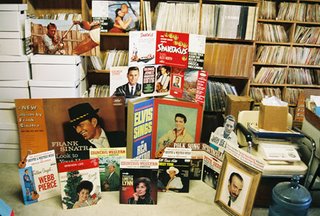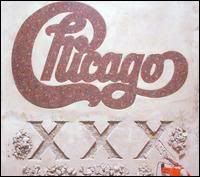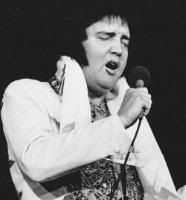Well, this article depressed the hell out of me. I'm including it here because I think it's very telling and informative, but if you're an actor, don't read it more than once, you'll want to jump out the window.
I'm including the full article here 'cause Salon makes you jump through hoops to read their shit, but if you want
the direct link.... I wouldn't want anybody to think I was, y'know, plagiarizing.
Apologies for the formatting issues.
Mar. 25, 2006 Salon
Confessions of a utility actor
I'm not a star. I'm not even a "name." I'm just a workaday actor trying
to make a living. And after 20 years of waiting for that big break, I'm
ready to move on.
By Peter Birkenhead
When I tell people I'm an actor, the second thing they ask is
always, "What's so-and-so like?" So I keep a mental card catalog of
pithy responses designed to strike just the right balance between
regular-guy humility and possible access to medical records. George
Clooney is a hugger. Portia DeRossi smells really good. And Patrick
Dempsey is very skinny. This Tuesday night I'm on an episode
of "House," and sooner or later I know I'll be at a party telling
someone that Hugh Laurie rides a motorcycle to work.
But to get to that second question I have to answer the first -- "What
shows have you been on?"-- which is usually asked as if I'm on trial
for impersonating an actor. I don't know what makes people so junkyard-
dog proprietary about television shows and their favorite stars. Maybe
it's the intimacy of the TV-watching experience -- after all, we
usually do it at home, alone, on couches. We think of actors as people
we see every night in our living rooms, like old friends we just
haven't gotten around to meeting yet. So if we don't know who someone
is, how can he be an actor?
The answer: with a very thick skin.
I am not one of those "old friend" actors. I'm not a star -- I'm not
even a "name." But I'm not an extra either. Actors like me occupy the
space in people's minds reserved for utility infielders, station wagons
and pizza places. For most people, actors are divided into two groups:
Martin Sheen and furniture. You're part of the pantheon or part of the
scenery.
When I was young I studied with Uta Hagen, who wrote the seminal
actor's handbook "Respect for Acting." And that's what my friends and I
wanted back then: respect, for acting. That and girls. We very much
wanted our work to be well thought of, admired, but we also wanted to
be famous. Not too famous. Just enough to get sex, but not stalked.
Theater famous.
Mostly we just wanted to act. I know that may be hard to believe, but
when you do it semi-right, acting is actually about getting away from
your ego. It's like riding a rocket away from your ego and becoming
weightless. And the two things you're incapable of when you're floating
up there are thinking and caring what other people think. Any actor who
has ever taken even a few baby steps in the direction of that stupid
delight knows how close to perfection it feels -- and also how much sex
and respect it gets you afterward.
When I left New York eight years ago, I'd been doing pretty well -- a
couple of yearlong runs in the Broadway shows "Brighton Beach Memoirs"
and "Broadway Bound," a few national tours, a bunch of regional
theater. I had a decent if hardly spectacular career going -- I usually
got good reviews, and casting directors were sometimes flattering --
but after I had been in Los Angeles for a couple of weeks, I was pretty
sure I would eventually have a theater named after me. That's because,
on more than one occasion, casting directors had pulled their glasses
off very dramatically and said to me, "You are a great actor." Exactly
like that. Not "You're a great actor," with the contraction, but "You
are a great actor." All five words, spoken slowly. I was shocked. I was
used to auditioning in big rehearsal studios in New York, where I had
to project to be heard by the people at the other end of the room, but
in L.A. I was suddenly auditioning in tiny, little well-appointed
offices, w
ith upholstered furniture, and I was still giving theater-size
performances, full of life-and-death intensity and semaphore-like body
language. Yet I was getting this very dramatic praise.
So I started to believe it. I am a great actor. I stared at the ceiling
at night and rehearsed the avuncular speeches I would make to students
accepting the Peter Birkenhead Scholarship at Juilliard. And then,
after a third week passed and I hadn't signed an actual contract, I
started to realize that, in Hollywood-speak, "You are a great actor"
loosely translates to "You're an actor."
The thing you want to hear at an audition is silence -- the sound of
people quietly smiling. This means, Hey, we're gonna see you next week;
no need to blow smoke in case you become famous; you're getting the job
and that's flattery enough. Over the next few months, I learned how to
stop playing to the balcony and start playing to the couch -- and I
started to hear a lot more encouraging silence. I was getting the hang
of Hollywood.
I finally landed my first television job, playing a fast-talking
schmuck of an agent on a Steven Bochco show called "Murder One." Even I
was struck dumb by how good I was in the audition. I don't think I even
said "thank you" as I left the room, because I was too busy
thinking, "I am a great actor."
Now, there is almost no describing how terrible I was on "Murder One,"
but here's my best shot: You know that famous "deer in the headlights"
look? Well, imagine the same deer about two weeks later. You know,
after the stuffing and mounting. That's the kind of taxidermic look of
fear that you will see on my face if you ever see this scene, which you
will only if they create a show called "TV's Funniest Bloopers and
Apparent Brain Hemorrhages."
Here's what you won't see if you ever catch this episode: Bochco, I
swear, sitting five feet away from me, with his head in his hands.
Seriously. Like, "How did my life come to this?" Like, "How is it
possible that all the safeguards we have in place to prevent this kind
of disaster from happening could all fail on the same day?"
But I got better. I did some recurring roles on a few shows, and I was
a guest star on a bunch of others. I even did another Steven Bochco
show, "NYPD Blue," playing a fast-talking schmuck of a stockbroker
(hey, wait a minute …), whom Dennis Franz "liked" for a murder, and I
started settling into the Los Angeles version of the working actor's
life.
Here's what that life is like: Only 5 percent of people who call
themselves actors earn enough each year from acting to support
themselves. So the number of actors who drive to work in a Porsche, or
home through ornate electronic gates, is microscopic. I drive a Honda
Hybrid, and I park it on the street in front of my apartment building.
I did own a house once, with my ex-wife, but home ownership and
marriage are pretty fragile things for people who sometimes wonder if
they'll ever work again.
So I learned early that when I'm on a set I should do my best to enjoy
myself, which isn't always easy. A Hollywood set is basically a boredom
factory; I can't think of a single day job I've had that wasn't more
pleasant, in a material sense, than working in television. At least
when I waited tables I was in a decorated, well-lit place. There was
the smell of fresh food cooking, and sometimes music was playing. It's
not like that on a soundstage. A soundstage smells like plywood, heated
rubber and Teamsters. It sounds like the inside of a police van on a
stakeout, except when it sounds like a house being renovated. So I
usually find myself spending a lot of time visiting the "crafts
services table" -- the place where all the doughnuts and Twizzlers are
kept. Working in television can be as boring as watching television,
and it's best dealt with exactly the same way: by taking breaks to go
stare at food, and sometimes eat it.
Series regulars, the stars of the shows, all have time killing down to
an art. Tyne Daly knits like crazy. George Clooney shoots hoops. On the
best days, there's a real foxhole-buddies kind of feeling on the set,
and it's pretty easy for me to be seduced into believing I'm on a kind
of egalitarian, socialist TV kibbutz, where everyone comes to work in
jeans and eats breakfast together. There's a lot more getting along
than you might think, and everyone is busy pitching in. The Steadicam
guy is trying to walk backward around the actors as they do emergency
rhinoplasty, and the props guy is trying to find a scalpel that has
suddenly been added to the scene. It's Mickey and Judy with $10
million.
The first thing I do when I get to work is make friends with the
director of photography. He's the one responsible for the way every
shot is framed and lit. At my most well rested I have dark circles
under my eyes, and the D.P. is the one who decides whether I get to
look like a really tired Jerry Seinfeld or a dead Steve Buscemi. This
is the kind of thing I never cared about in New York, but need to care
about now.
I finally became a series regular on a very bad Ted Danson sitcom
called "Becker," playing his only mildly schmucky cousin/accountant.
Now, I'd be lying if I said my first thought wasn't "I'm gonna get to
take my new girlfriend to Ted Danson's house for lunch, and she's gonna
think I'm the shit." But my second thought was about getting back to
New York, and what a two-bedroom apartment might be going for in, oh,
about five years. I got tons of laughs during rehearsals for the pilot;
Ted Danson even told me I was "great" (uh oh), and the night we shot
the pilot, his wife, Mary Steenburgen, grabbed me by the arm and
said "I love your character most of all." Just before the show, I took
a walk around the place to soak in the feeling of my new home, and for
the first time since I'd worked on Broadway, I let myself imagine a
life that included enough health insurance to have children. But I was
fully fluent in Hollywood-speak by then, so I knew that when, at the
party on the set
afterward, the president of Paramount Television gave me a big hug and
said, "You are going to be at Paramount for a very long time," it meant
I was going to be at Paramount for about 11 more minutes. My character
was cut from the show a month later.
The executive producer called me to deliver the news and said he had
just gotten off the phone with Les Moonves, the president of CBS, and
that Les had said, among other things, "I'm a big Peter Birkenhead
fan." As my grandfather might have said, "With fans like that, who
needs hot air?"
I thought I would be devastated -- I wanted to be devastated. But the
truth is, when I saw an episode of "Becker" a few months later, I could
hear the distinct and comforting sound of a bullet whizzing by my head.
And you know what was most comforting of all? That it happened again,
right away. The first job I got after "Becker" was on "Frasier," and
that character was cut, too. I realized that losing jobs was just part
of the job. My metamorphosis into an L.A. actor was complete.
I've worked a lot since then, on shows like "Ally McBeal," "The West
Wing," "Six Feet Under" and "Grey's Anatomy" -- mostly in parts that
were interesting enough to keep me chasing the next job and well paying
enough to cover the rent. None of that would have happened if I hadn't
gotten hugged at Paramount, so I'm grateful things went the way they
did. And now they're going a new way.
The guiding principle in television is "get the shot," which means keep
shooting, and talking, no matter what happens, because it might be good
enough to move on and finish the episode on time and keep your job. So
actors keep plugging away, trying to get the shot -- get their shot at
making it -- even when the odds are staggeringly against them. But the
definition of "making it" keeps changing as you hit your 40s and people
like Donald Trump become stars.
Don't get me wrong, I'm still an actor -- I'm still available for the
calls when they come -- but mostly I'm busy with other things. I've
written the word "actor" in the "occupation" space on my tax return for
20 years, but this year I'll probably put "writer."
My old dogmas about doing only the noble work of theater became
obsolete as soon as I discovered the nobility to be had in punching a
studio clock and getting paid for an honest day's work. But I'm not
sure how much longer I'll be doing that. Being an actor requires a
belief in limitless possibilities, and these days I actually prefer
limits. When you suspect a star-making, life-changing gig is around
every corner it becomes difficult to believe in anything else. But I
still watch television, and I love seeing my friends when they're in
something. It's always like watching a small triumph: Someone's working
again after a dry spell, or got their dental insurance back.
A little happy ending, at least for now.
-- By Peter Birkenhead











